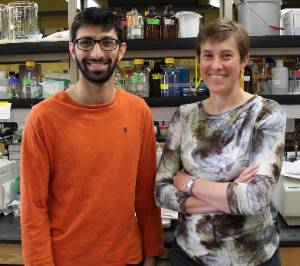Undergraduate research experiences have made med school a little easier for Shamir Khan. A Wichita State chemistry alum, Khan is approaching his second year at the University of Kansas School of Medicine.
“I’m like a step ahead of someone who wouldn’t have done research before and it’s just something that kind of helps me with current research projects,” Khan said.
Khan compiled a number of research experiences while at Wichita State. He worked with Moriah Beck, professor of chemistry and biochemistry, doing course-based research on personalized medicine and trying to understand some of the mysteries of genomics. Khan also worked in Beck’s lab for his honors research requirement and as a freshman in the First Year Research Experience program.
For his undergraduate research, Khan conducted mutations in the amino acid sequence of lactate dehydrogenase, a protein, to see how the changes would alter its structure, function and stability. He and his classmates wanted to answer the question of how those mutations could affect the protein
 Cheryl K. Miller
Cheryl K. Millerfunction in order to improve understanding of the correlation between genomic changes and disease with the ultimate goal to improve personalized medicine.
One of the strengths of undergraduate course-based research, Beck said, is that it allows students to be creative.
“They’re unable to do this in a teaching lab where they’re following a protocol and learning the techniques,” Beck said. “Here, they’re actually able to think more creatively about what questions are still unresolved. Taking a project in a new direction gives them more ownership in it.”
Khan views his research experiences as instrumental for his success in med school. He’s already learned techniques others in his cohort are just now encountering.
“The really useful skills I learned were how to be on a team,” he said. “You have to work with other people and rely on them and figure out how to communicate when you have different perspectives. That’s an underrated part of research.”
He’s also learned how to write a manuscript, make experiment plans and analyze data.
“You can only learn through experience to be able to do that,” Khan said. “I’m a step ahead of someone who wouldn’t have done research before, and it’s something that helps me with my current research project.”
Khan advises students to take time to decide if research is the right activity for them.
“If you’re hesitant about research, stick with it for more than a couple of months because you might think it’s too much at first,” Khan said. “You have to stick with it and get past that point where you’re feeling really overwhelmed. You can get to a spot where you feel comfortable and once you get there it’s just the best thing in the world.”

